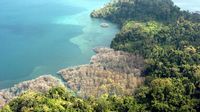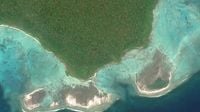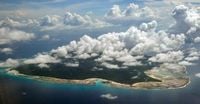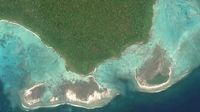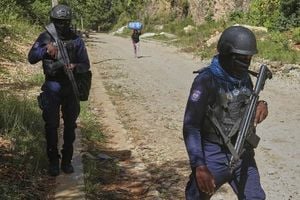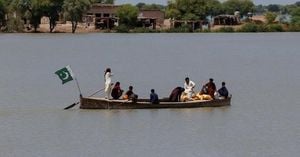An American YouTuber was arrested by authorities in India after he allegedly tried to make contact with an isolated Sentinelese tribe on North Sentinel Island, part of the Andaman and Nicobar Islands territory. Mykhailo Viktorovych Polyakov, 24, made the illegal journey to the restricted Indian Ocean island on March 29, according to Indian police. Polyakov filmed his visit and left a can of Diet Coke and a coconut on the shore as an offering to the tribe. For thousands of years, the people of North Sentinel Island have been isolated from the rest of the world. Outsiders are not allowed to travel within three miles of the island to protect the Indigenous people from diseases and to help preserve their way of life.
“The American citizen was presented before the local court after his arrest and is now on a three-day remand for further interrogation,” Andaman and Nicobar Islands’ police Chief HGS Dhaliwal said, according to CBS. Dhaliwal reported that Polyakov kept blowing a whistle for about an hour to attract the tribe’s attention before he went ashore. “He landed briefly for about five minutes, left the offerings on the shore, collected sand samples, and recorded a video before returning to his boat,” Dhaliwal said. “A review of his GoPro camera footage showed his entry and landing into the restricted North Sentinel Island.” Police stated that the YouTuber was arrested on March 31, two days after his visit ashore on the North Sentinel Island.
Authorities revealed that Polyakov had visited the region twice before, and both times he attempted to access the island. He used an inflatable kayak in October 2024 but was stopped by hotel staff, according to police. He also made another attempt to visit the island in January 2025. During his journey in March, Polyakov used another inflatable boat with a motor to travel through the open sea to the island. Polyakov isn’t the first outsider attempting to make contact with the Sentinelese. In November 2018, American missionary John Chau was believed to have been killed by arrow-wielding tribesmen on North Sentinel after he came to the island bearing gifts that included a football and fish. He interacted with some of the tribesmen—who survive by hunting, fishing, and collecting wild plants—and are known for attacking anyone who comes near with bows and arrows and spears.
The arrow struck a book Chau was carrying, which an acquaintance said was a Bible. The 26-year-old adventurer and Christian missionary then swam back to a boat of fish harvesters waiting at a safe distance. That night, he wrote about his adventures and left notes with the fish harvesters. He returned to North Sentinel Island the next day, on Nov. 16, 2018. What happened then isn’t known, but on the morning of the following day, the fish harvesters watched from the boat as tribesmen dragged Chau’s body along the beach and buried his remains. Dependera Pathak, director-general of police on India’s Andaman and Nicobar Islands, said at the time that seven people had been arrested for helping the American reach North Sentinel Island, including five fish harvesters, a friend of Chau’s, and a local tourist guide.
Although visits to the island are forbidden by the government, officials worked with anthropologists to try to recover his body. Chau was apparently shot and killed by arrows, but the cause of death was not confirmed as his body was never recovered. Survival International, a group that advocates for the rights of Indigenous and tribal people, issued a statement following Polyakov’s arrest and said that the alleged act endangered his life and the lives of the tribe. “Reports that a US national has been arrested after landing on North Sentinel Island in the Indian Ocean to make contact with the uncontacted Sentinelese people are ‘deeply disturbing,'” Caroline Pearce, the organization’s director, said. “It beggars belief that someone could be that reckless and idiotic. This person’s actions not only endangered his own life, they put the lives of the entire Sentinelese tribe at risk. It’s very well known by now that uncontacted peoples have no immunity to common outside diseases like flu or measles, which could completely wipe them out,” she continued.
Pearce said it was “good news” that Polyakov got arrested, but she was disturbed that he was “reportedly able to get onto the island in the first place.” “The Indian authorities have a legal responsibility to ensure that the Sentinelese are safe from missionaries, social media influencers, people fishing illegally in their waters, and anyone else who may try to make contact with them,” Pearce said. Polyakov’s YouTube channel uses the handle Neo-Orientalist and has a six-part series called “Taliban-Controlled Afghanistan Through American Eyes.” The YouTuber, who spent three weeks in Afghanistan, is shown holding a machine gun in the footage and traveling around the country on a road trip.
In a broader context, Polyakov’s actions reflect a concerning trend of individuals seeking thrill and adventure at the expense of Indigenous rights and safety. The Sentinelese, who use spears and bows and arrows to hunt and gather, have made it clear over the years that they wish to remain isolated. The Indian government has enforced strict regulations to protect the tribe, which is believed to number between 50 and 200 individuals. With the rise of social media, there is growing concern among advocates for Indigenous rights that more individuals like Polyakov will attempt similar stunts, putting both their lives and the lives of isolated tribes at risk.
As Polyakov awaits his court hearing scheduled for April 17, the implications of his actions continue to reverberate. The case raises questions about the responsibilities of governments to protect Indigenous populations from outside contact and the ethical considerations of adventure tourism. The incident not only underscores the dangers of such reckless behavior but also highlights the need for greater awareness and respect for the rights and wishes of Indigenous peoples worldwide.

